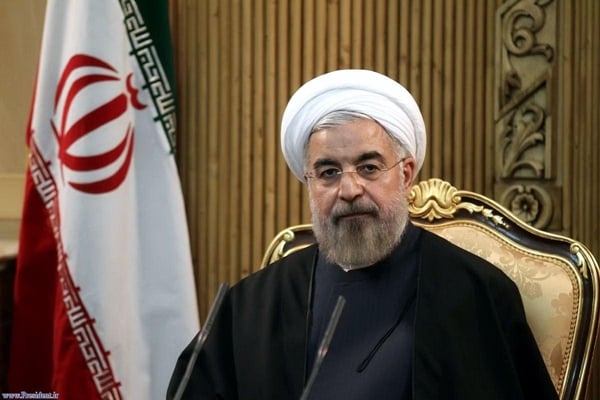Rouhani announced on May 8, 2019 that Iran would stop two of its commitments under the Iran nuclear deal known as the Joint Comprehensive Plan of Action (JCPOA).
“Today, we announced to the heads of the five countries [which are parties to the JCPOA] that we would stop two actions that we’ve been doing so far,” said Rouhani.
He said Iran would stop selling its surplus “enriched materials” and “heavy water.”
“To put it simply, those two actions are [to stop] two sales. Whenever our enriched materials reached 300 kilograms, we would sell the surplus to that amount to another country and get yellowcake in return. The second sale pertains to heavy water. Whenever our heavy water reserves exceeded 130 tonnes, we would sell the surplus to other country. And today we are stopping those sales,” he said.
“As of today, we will sell neither our enriched uranium, nor our heavy water,” the president stressed.
He said the measure will remain in effect for 60 days.
“If they come to the negotiating table in 60 days and secure our key interests, that is [interests pertaining to] oil and banking transactions, we will return to the first place [and roll back our measures],” he said.
“If we don’t reach agreement at the end of those 60 days, we will take two more actions,” President Rouhani noted.
Under the JCPOA, Iran has undertaken to enrich its uranium at the maximum level of 3.67 percent purity, Rouhani said.
Following the 60-day period, Iran will not observe that limit any more.
He noted the second of the next two actions Iran would take if no agreement is reached in these 60 days would be to make a decision on whether or not the other parties to the JCPOA should still cooperate in the renovation of the Arak Heavy Water Reactor as stipulated in the nuclear deal.
“In the second phase, too, Iran will give them another 60 days. If still no agreement is reached, we will take yet another action,” he said.
He noted if the other parties to the JCPOA want to send Iran’s case to the UN Security Council, Iran will take firm action as stipulated in five letters sent on behalf of President Rouhani to ambassadors of those five countries in Iran.
He underlined that Iran has not withdrawn from the JCPOA, and has only scaled down its commitments under the deal.
President Rouhani also lashed out at the United States for illegally and unilaterally withdrawing from the JCPOA a year ago. He said Washington expected Iran to follow suit right after the US pulls out of the treaty. However, he added, Iran remained patient and acted with prudence.
Full Text of Iran’s Statement on ‘Reducing’ JCPOA Commitments
“By pulling out of the JCPOA, the US wanted to make Iran withdraw from the agreement the following day, so that it would be able to take Iran’s case to the UN Security Council and ease the burden from US shoulders and increase pressure on Iran,” he said.
Nevertheless, the president noted, Iran’s prudence kept it from falling into Washington’s trap.
He said the problem is that the Europeans no longer regard the US as the “master” in political and legal issues, but still see Washington as having the final say in economic issues.
“Unfortunately, in the economic domain, European companies and banks still regard the United States as ‘the master,’ and this wrong way of thinking results in them being unable to make proper decisions for the interests of Europe, the region and the world, and hence, they unfortunately buckle under pressure,” he said.
Elsewhere in his remarks, President Rouhani recalled that the International Atomic Energy Agency (IAEA) has, on numerous occasions, corroborated Iran’s compliance with all of its commitments. He said the parties to the JCPOA have also confirmed that Iran has not been able to reap all the benefits of the deal following Washington’s withdrawal.
“So, everyone accepts that there is an imbalance,” he said.
